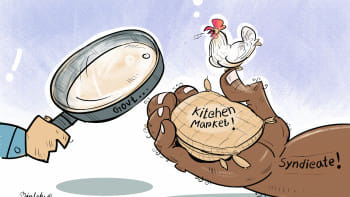Protect the interests of marginal poultry farmers

The poultry industry is one of the most important sectors in Bangladesh, providing employment and food to millions of people. However, behind this story lies a grim reality of exploitation faced by the small and marginal poultry farmers. According to a recent report, these farmers often find their production costs to be higher than the market price, forcing them to incur losses. It happens because they have to buy one-day-old chicks and poultry feed from large farms, who can easily hike the costs of these products with the help of middlemen and syndicates while manipulating the market price to increase their profit. In the absence of effective regulation, marginal farmers have no choice but to fall into line with the big companies.
According to an estimate by the Bangladesh Poultry Association, the current situation has driven nearly two-thirds of marginal farmers out of business. There were nearly 1.6 lakh marginal farmers in the country. Of them, only 60,000-65,000 are now in business. More worryingly, this situation has made sure that broiler prices remain consistently high, increasingly taking what many consider to be the "poor man's protein" out of the reach of the poor. A by-product of the high production cost has been the rise of contract farming, an exploitative model of business that reduces production costs for farmers but takes away their autonomy and bargaining power.
The whole system, from our vantage point, appears to be rigged for the big firms – and against the small entrepreneurs and farmers. And so long as the former have control over the supply/production of chicks and poultry feed, production costs for the marginal farmers will continue to be higher and the broiler market will continue to remain in disarray. This is totally unacceptable.
The question is, why have the authorities failed to respond properly to the months-long chaos in the poultry market? We have frequently urged them to address the exploitation and manipulation leading to the still high prices of broiler and eggs, to little effect so far. Only blaming the volatile trends in the global market is no longer convincing enough. True, some effects of the ongoing global/local crises on production costs, and consequently broiler prices, are to be expected. But not to the extent that is presently seen. This calls for strong and judicious interventions from the government which must rein in the powerful market manipulators and extend support to the struggling marginal farmers.

 For all latest news, follow The Daily Star's Google News channel.
For all latest news, follow The Daily Star's Google News channel. 





Comments